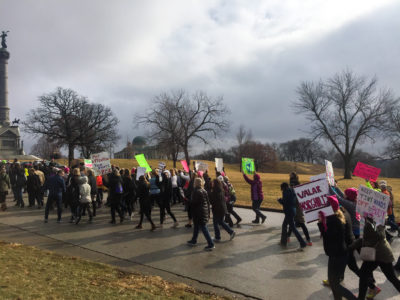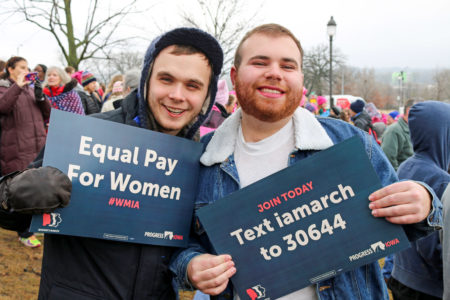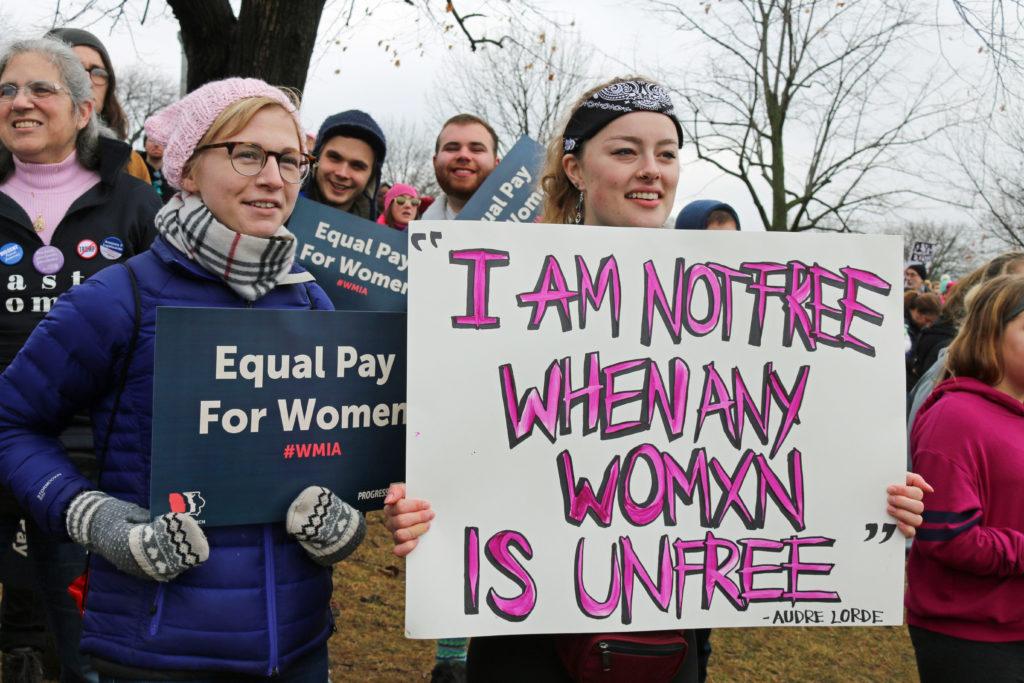By Megan Tcheng
tchengme@grinnell.edu
Activists from across the state of Iowa flocked to the State Capitol in Des Moines this past Saturday, Jan. 21, to fall in stride with millions of activists worldwide.
Mothers, children, grandparents, husbands, friends and strangers alike filled the streets of the city. Many participants wielded homemade posters and banners, while others donned cat ears and hand-knitted pink hats – a trademark of the march made popular by The Pussyhat Project, a Los Angeles-based internet campaign.
Totaling over 26,000 people, the Des Moines Women’s March participants vastly exceeded the crowd estimates predicted by the March chapter’s captains, which just a week before estimated that the number would be closer to 6,000 attendees. Such unanticipated support was echoed by the 600-plus sister-marches held in cities across the world, including the Women’s March on Washington, which brought over 500,000 protestors to the center of Washington DC’s National Mall.

Grinnell students, faculty and staff joined the crowd of Iowa residents at the Women’s March, while countless other students participated in sister-marches in their respective hometowns. Cara Bresnahan ’19 made the hour-long trip from her dorm to the front steps of the Iowa State Capitol Building with a group of friends and fellow classmates.
“There was something about standing with over ten thousand other women that was empowering and made me feel like we could actually cause change. … The march, to me, became more about the strength of women coming together to support each other rather than about Trump,” Bresnahan wrote in an email to The S&B.

While attendees championed a range of different causes, from LGBTQ rights to criticisms of the country’s new president, the prevailing sentiment of the Des Moines Women’s March centered around the event’s theme of unity in support of women’s rights. The coordinators of the event, represented by the Women’s March Iowa Chapter, chose not to identify the march as a protest and instead advocated for an intersectional platform.
“We stood together in solidarity with our partners and children for the protection of our rights, our safety, our health and our families – recognizing that our vibrant and diverse communities are the strength of our country,” explained the Des Moines Women’s March Chapter on their Facebook page.
Rallied by the march’s message of unity, participants wove through the block-long route surrounding the capital and joined their voices in a series of songs, chants and cheers. The march’s attendees, which spanned a wide range of age, gender, race and religious identities, worked to find common ground and rally in the strength of their numbers. Professor Kesho Scott, American Studies, reflected on her experience as a speaker at the Des Moines march.
“So many young people and new people came out and, as a point of new unity, we [chose not to] talk about how we were different. We talked about what we were all sharing in terms of the experience. People brought their families and their partners. It was multigenerational,” Scott said.
Both before and after the march, a steady stream of musicians and local speakers took the stage in order to rally support from the event’s crowd of attendees. Scott, a locally recognized activist, joined the lineup of speakers. In her resounding message, Scott stressed the importance of stepping up to the plate and recognizing American’s extensive history of activism.
“The bottom line… for me was that marches on Washington are an American institution and a right and a privilege. That was the most important message – that this isn’t just a rally to respond to something. It is a rally to put yourself into history and a commitment that you will do the work that unity and equality [require].” Scott said.
Now, after the resounding impact of the Women’s March, participants in Des Moines and across the world must face the question of “what’s next?” For both students at Grinnell and beyond, Professor Katya Gibel Mevorach, Anthropology, expressed hope that the march could be a first step towards further activism.
“Now comes the hard work of working at the grassroots… Cumulatively there needs to be a change and a collaboration, [because] collectively, we can make an impact. Be informed about the actions you can take…Call your senators… Organize…That’s what gets things to change” said Gibel Mevorach.



































































